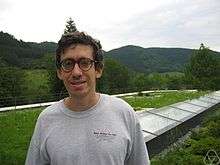Noam Elkies
| Noam Elkies | |
|---|---|
|
Noam Elkies in 2007 | |
| Born |
August 25, 1966 New York City |
| Nationality | American |
| Fields | Mathematics |
| Institutions | Harvard University |
| Alma mater |
Columbia University, Harvard University |
| Doctoral advisor |
Benedict Gross Barry Mazur |
| Doctoral students | Henry Cohn[1] |
| Notable awards |
Putnam Fellow Levi L. Conant Prize (2004) |
Noam David Elkies (born August 25, 1966) is an American mathematician and chess master. Along with A. O. L. Atkin, he extended Schoof's algorithm to create the Schoof–Elkies–Atkin algorithm. In 1993, when he was 26 years old, he became the youngest full professor in the history of Harvard University.
Early life
In 1981, at age 14, Elkies was awarded a gold medal at the 22nd International Mathematical Olympiad, receiving a perfect score of 42 and becoming one of just 26 participants to attain this score,[2] and one of the youngest ever to do so. Elkies graduated from Stuyvesant High School in 1982[3][4] and went on to Columbia University, where he won the Putnam competition at the age of sixteen years and four months, making him one of the youngest Putnam Fellows in history.[5] He was a Putnam Fellow two more times during his undergraduate years. After graduating as valedictorian at age 18 with a summa cum laude in Mathematics and Music, he earned his Ph.D. at the age 20 under the supervision of Benedict Gross and Barry Mazur at Harvard University.[6]
Work in mathematics
In 1987, he proved that an elliptic curve over the rational numbers is supersingular at infinitely many primes. In 1988, he found a counterexample to Euler's sum of powers conjecture for fourth powers.[7] His work on these and other problems won him recognition and a position as an associate professor at Harvard in 1990.[3] In 1993, he was made a full, tenured professor at the age of 26. This made him the youngest full professor in the history of Harvard.[8] Elkies, along with A. O. L. Atkin, extended Schoof's algorithm to create the Schoof–Elkies–Atkin algorithm. In 1994 he was an invited speaker at the International Congress of Mathematicians in Zurich.[9] In 2004 he received a Lester R. Ford Award.[10]
Elkies also studies the connections between music and mathematics. He sits on the Advisory Board of the Journal of Mathematics and Music.[11] He has discovered many new patterns in Conway's Game of Life[12] and has studied the mathematics of still life patterns in that cellular automaton rule.[13] Elkies is a fellow at Harvard's Lowell House.[14]
Chess
Elkies is a composer and solver of chess problems (winning the 1996 World Chess Solving Championship).[8] He holds the title of National Master from the United States Chess Federation, however he no longer plays competitively.[15]
References
- ↑ http://math.mit.edu/directory/profile.php?pid=1224
- ↑ "Noam Elkies's results". International Mathematical Olympiad.
- 1 2 "Noam Elkies c.v.". Retrieved 2007-10-31.
- ↑ Castillo, Tom (April 20, 2000). "Fifteen Minutes: Gnoshin' with Noam". The Harvard Crimson.
- ↑ Gallian, Joseph A. "The Putnam Competition from 1938–2006" (PDF). Retrieved 2007-10-31.
- ↑ The Mathematics Genealogy Project – Noam Elkies
- ↑ "Mathematicians Find New Solutions To An Ancient Puzzle". 2008.
- 1 2 McClain, Dylan Loeb (August 28, 2010), "Skilled at the Chessboard, Keyboard and Blackboard", The New York Times
- ↑ http://www.mathunion.org/db/ICM/Speakers/SortedByLastname.php
- ↑ Elkies, Noam (2003). "On the Sums ". Amer. Math. Monthly. 110: 561–573.
- ↑ "Editorial Board of Mathematics and Music".
- ↑ Game of Life Status page, Jason Summers.
- ↑ Elkies, Noam D. (1998). "Voronoi's Impact on Modern Science, Book I". Proc. Inst. Math. Nat. Acad. Sci. Ukraine, vol. 21: 228–253. arXiv:math.CO/9905194
 ..
.. - ↑ "Lowell House: SCR". Retrieved 2009-07-27.
- ↑ Noam D Elkies rating card, USCF
External links
- Personal site of Noam Elkies at Harvard University
- Noam Elkies at the Mathematics Genealogy Project
- Endgame Explorations – an 11-part series of articles by Noam Elkies in Chess Horizons
- Noam Elkies on LifeWiki
